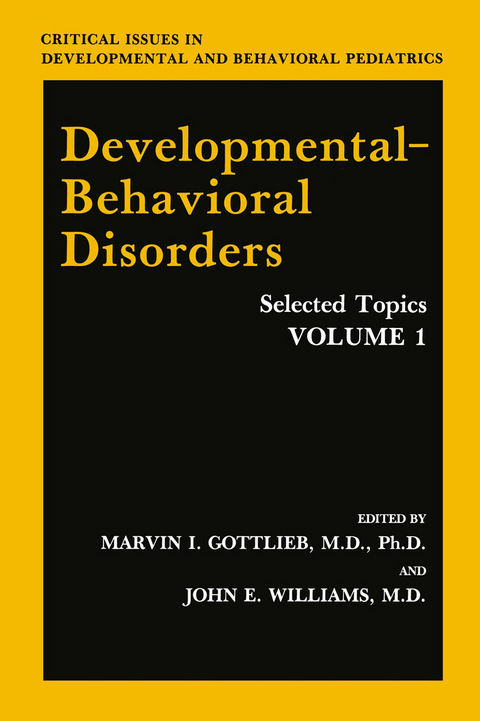
Developmental-Behavioral Disorders
Springer-Verlag New York Inc.
978-1-4612-8255-6 (ISBN)
1: New Genetic Syndromes.- 2: Adolescents with Chronic Handicaps: Problems of Sexual and Emotional Development.- 3: Divorce: A Developmental-Behavioral Disorder?.- 4: The Learning-Disabled Child/Adolescent: Improving Self-Esteem.- 5: Military and Civilian Developmental Medicine: Bridging the Gap.- 6: Hospitalization of Children: Its Impact, Use, and Abuse.- 7: The Physician in the Courtroom: How and How Not To Act.- 8: Office Management of the Oppositional Child.- 9: Promoting the Development of Children in Busy Primary Health Care Settings.- 10: Chronic Otitis Media, Speech/Language Disorders, and Learning Disabilities: Is There a Link?.- 11: The Latchkey Child: A New Psychosocial Challenge in Developmental-Behavioral Pediatrics.- 12: Emotional and Behavioral Milestones in Infancy and Early Childhood.- 13: Accepted and Controversial Neuromotor Therapies for Infants at High Risk for Cerebral Palsy.- 14: Child Abuse and Neglect.- 15: Ideas from Our Evolutionary Past: Implications for the Care of Children at the End of the Twentieth Century.- 16: Developmental Disabilities: The Military Experience.- 17: Learning Disabilities: A Neurologist’s Perspective.- 18: Epilepsy: Developmental and Behavioral Sequelae.- 19: Childhood Headaches.- 20: Neurologic Aspects of Autism and Rett Syndrome.- 21: Adolescent Alcohol Abuse: A Review.- 22: The Controversial Therapies Proposed for Treatment of the Child with Learning Disabilities and/or Attention Deficit Disorder.
| Reihe/Serie | Critical Issues in Developmental and Behavioral Pediatrics |
|---|---|
| Zusatzinfo | 392 p. |
| Verlagsort | New York, NY |
| Sprache | englisch |
| Maße | 152 x 229 mm |
| Themenwelt | Medizinische Fachgebiete ► Chirurgie ► Neurochirurgie |
| Medizin / Pharmazie ► Medizinische Fachgebiete ► Neurologie | |
| Medizin / Pharmazie ► Medizinische Fachgebiete ► Pädiatrie | |
| Medizin / Pharmazie ► Medizinische Fachgebiete ► Psychiatrie / Psychotherapie | |
| ISBN-10 | 1-4612-8255-1 / 1461282551 |
| ISBN-13 | 978-1-4612-8255-6 / 9781461282556 |
| Zustand | Neuware |
| Haben Sie eine Frage zum Produkt? |
aus dem Bereich


